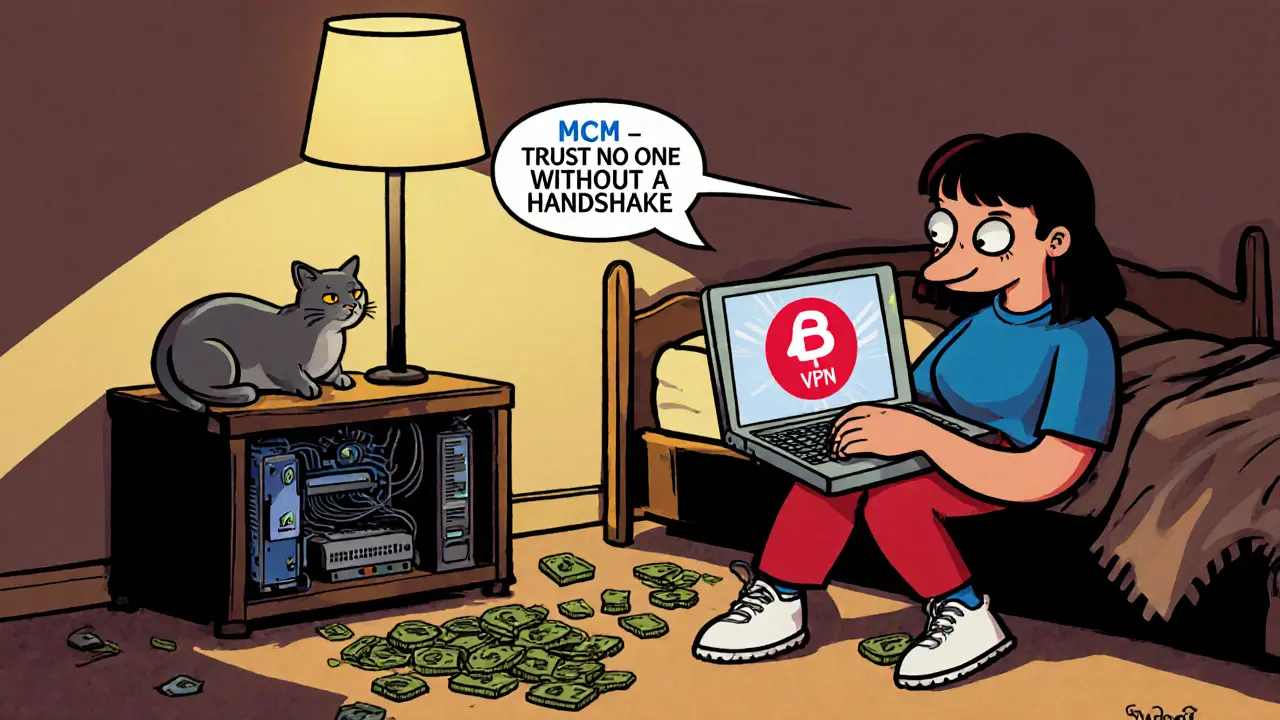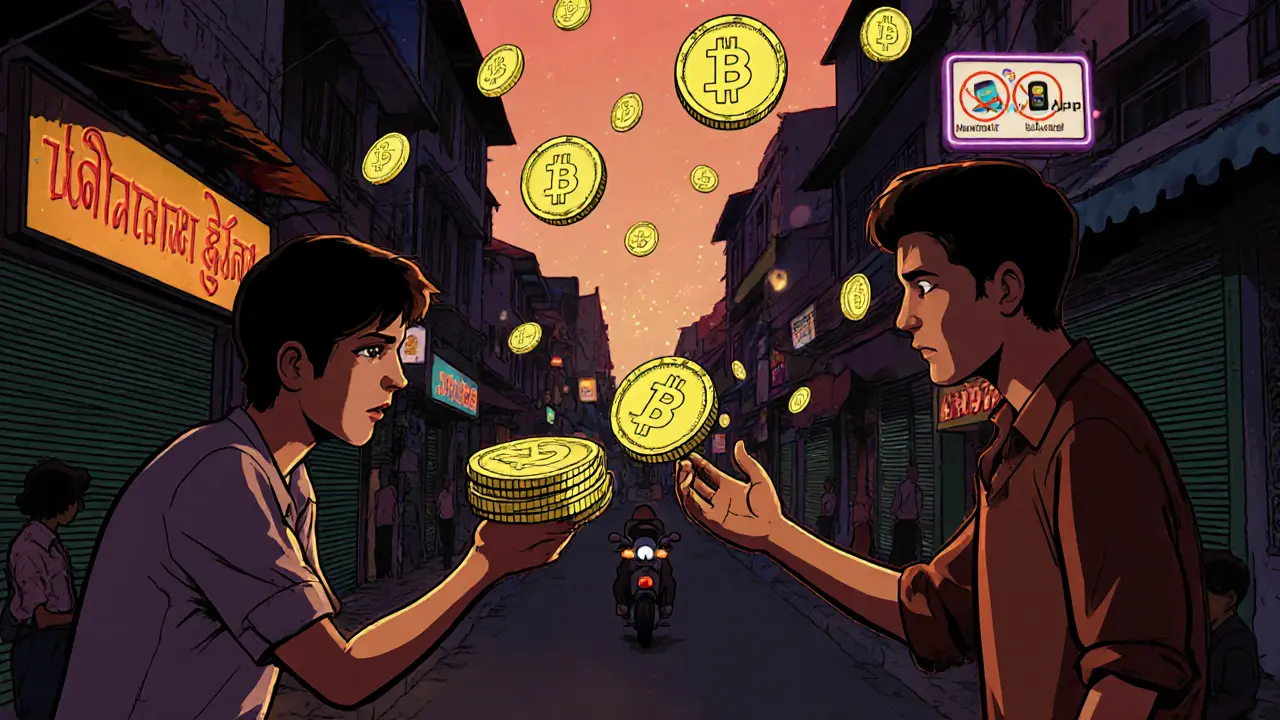Remittance Savings Calculator
Send Money from Myanmar
Traditional Banking
Crypto (USDT)
Total Savings
Important Note: In Myanmar, traditional remittances face 5-10% fees and 2-5 day delays. Crypto transactions typically cost 0.5-1% with near-instant delivery.
Myanmar’s government says cryptocurrency is illegal. But if you walk through the streets of Yangon or Mandalay, you’ll find people whispering about Bitcoin, Ethereum, and USDT like they’re talking about the weather. The Central Bank of Myanmar banned crypto in 2020. No exchanges. No mining. No legal trading. Yet, the market didn’t die-it went deeper. Today, in 2025, an underground crypto economy thrives, built on trust, WhatsApp groups, Facebook pages, and cash handoffs in back alleys.
How Crypto Survives a Total Ban
The military regime in Myanmar doesn’t just discourage crypto-it punishes it. Under the Foreign Exchange Management Law, anyone caught trading digital assets can face prison time, bank account freezes, and asset seizures. The government doesn’t need to shut down every transaction. It just needs to scare enough people into silence. But fear doesn’t stop need. For millions of Myanmar citizens, traditional banking is broken. Banks are controlled by the military. International transfers are blocked. Remittances from abroad? Often delayed for weeks or lost entirely. Crypto became the only way out. People aren’t trading for profit. They’re trading to survive. The system works like this: Someone in Thailand sends USDT to a trader in Myanmar. That trader finds a local buyer through Telegram. The buyer pays cash-real, physical kyat-into the seller’s bank account. The seller then sends the crypto. No paper trail. No exchange. No middleman. Just two people trusting each other enough to risk jail.The Invisible Infrastructure
There are no official crypto exchanges in Myanmar. But there are dozens of unofficial ones. The biggest? Facebook groups. Telegram channels. TikTok accounts. These aren’t flashy platforms with logos and customer service. They’re just chat rooms with names like “Myanmar Crypto Cash Dealers” or “USDT Buyers Myanmar.” The most influential group is the Myan Crypto Masters Community (MCM), started by a man known only as Feliz. With over 23,000 members, MCM runs weekly online workshops in Burmese. They teach people how to set up a VPN, how to spot a scam, how to store private keys safely. They don’t sell crypto. They don’t take fees. They just share knowledge. And in a country where crypto education is forbidden, that’s revolutionary. Traders rely on trusted cash dealers-people with a reputation. You don’t just find someone on Facebook and send money. You ask around. You check references. You test them with small trades first. If you lose $500 because you trusted the wrong person, you don’t call the police. You learn. And you tell others.Why the Ban Keeps Failing
Why hasn’t the government crushed this market yet? Simple: they can’t monitor it all. Most transactions are under $100. They happen between friends, neighbors, coworkers. The authorities focus on big players-people moving thousands of dollars a day. But the real power of the underground market is its size. It’s not one big network. It’s thousands of tiny ones. A mother in Naypyidaw sends crypto to her son in Malaysia. A farmer in Shan State buys USDT to pay for medicine. A student in Taunggyi trades Bitcoin to fund their English course. Even the military’s own officials are rumored to use crypto. Why? Because it’s faster. Cheaper. Untraceable. The ban isn’t about protecting the economy. It’s about control. If people can move money without the state’s permission, the regime loses power. Compare this to Thailand or Laos. Both countries have clear crypto rules. Exchanges are licensed. Taxes are defined. People feel safe. In Myanmar? You feel like you’re playing Russian roulette every time you open your wallet.
The Risks Are Real
The stories are brutal. In 2022, a so-called “crypto investment scheme” promised 10% daily returns. Thousands of people poured in their life savings. Then, the operators vanished. No one was arrested. No money was returned. Victims had no legal recourse. No court would hear their case. The government didn’t care. Scams are everywhere. Fake wallets. Fake traders. Fake mining apps. Newcomers are easy targets. Many lose everything on their first try. That’s why MCM’s education matters so much. They teach people: never send crypto to someone you haven’t met in person. always verify the wallet address twice. never use your real name on trading groups. And then there’s the physical danger. In 2024, authorities raided a home in Hpa-An and seized three mining rigs. The owner, a 28-year-old engineer, was arrested. He spent three months in jail before being released without charge. His equipment was destroyed. His internet was cut. He still trades crypto now-quietly.Stablecoins Are the Real Currency
Bitcoin? Too volatile. Ethereum? Too slow. In Myanmar, the real crypto is USDT-Tether. It’s pegged to the U.S. dollar. It moves fast. It’s accepted everywhere. People use it to pay for food, rent, even bribes. Some use it to fund political resistance. The Spring Development Bank, run by the National Unity Government (NUG) in exile, uses the Polygon blockchain to send USDT to activists inside Myanmar. It’s not legal. But it’s the only way to get money to people the regime won’t let through. You won’t find USDT on any official app. You won’t see it advertised. But if you ask someone in Yangon how they pay for their daughter’s university fees, they’ll say: “USDT.”

Andy Purvis
November 11, 2025 AT 17:47Man this is wild. People are just finding ways to survive and the system still tries to control everything. It’s not crypto-it’s freedom.
FRANCIS JOHNSON
November 13, 2025 AT 05:00This is the most beautiful thing I’ve read all year. 🌱 People aren’t breaking laws-they’re rewriting them with their wallets. The regime fears crypto because it doesn’t need permission to exist. That’s power. That’s dignity. That’s human resilience in its purest form. If you think this is just about money, you’re missing the whole point. This is about voices that won’t be silenced. This is about mothers feeding their kids, students paying for books, farmers buying medicine. No bank. No bureaucracy. Just trust. And that’s scarier to dictators than any protest. 💪
Ruby Gilmartin
November 14, 2025 AT 03:17Let’s be real-this ‘underground economy’ is just a glorified Ponzi scheme waiting to collapse. You think people are trading for survival? Most are getting scammed daily. The fact that they’re using Telegram and Facebook groups proves how unregulated and dangerous this is. No oversight = chaos. And now you’re romanticizing it?
Douglas Tofoli
November 15, 2025 AT 23:33bro this is so cool 😍 i had no idea people were doing this kinda stuff in myanmar. i mean yeah scams are a thing but the fact that they’ve built their own system from scratch? that’s next level. i wish more people knew how resilient communities can be when they’re backed into a corner. 🙌
William Moylan
November 17, 2025 AT 03:07THE GOVERNMENT IS USING THIS TO TRACK PEOPLE. THEY LET IT HAPPEN SO THEY CAN SEE WHO’S USING CRYPTO. EVERY SINGLE WALLET ADDRESS IS BEING LOGGED. THE MILITARY IS WORKING WITH CHINA TO BUILD A BLOCKCHAIN SURVEILLANCE NETWORK. THEY’RE NOT TRYING TO STOP IT-THEY’RE TRYING TO OWN IT. YOU THINK YOU’RE FREE? YOU’RE BEING MONITORED. EVERY. SINGLE. TIME.
Michael Faggard
November 17, 2025 AT 17:18Let’s unpack this. The real innovation here isn’t the tech-it’s the social infrastructure. Decentralized trust networks replacing institutional failure. That’s what MCM is doing: building a peer-to-peer education layer without state sanction. This is textbook resilient system design. No central authority. No single point of failure. Just knowledge sharing and reputation-based verification. That’s not an underground economy-it’s a parallel civil society. And it’s operating at scale. This is the future of financial sovereignty in authoritarian states.
Elizabeth Stavitzke
November 18, 2025 AT 17:32Oh look, another ‘crypto is freedom’ fairy tale from the Silicon Valley echo chamber. Let me guess-you also think Bitcoin will save the world while you sip your oat milk latte? People in Myanmar aren’t heroes-they’re desperate. And desperation doesn’t create innovation. It creates victims. This isn’t rebellion. It’s a failed state’s last gasp.
Ainsley Ross
November 19, 2025 AT 07:01Thank you for sharing this deeply human story. In a world obsessed with blockchain tokens and DeFi yields, we forget that behind every transaction is a mother, a student, a farmer. The fact that they’ve built trust networks without formal institutions speaks volumes about the strength of community. This isn’t just about money-it’s about agency. And in a country where agency has been stripped away, crypto has become a quiet act of resistance. I hope the world listens-not just to the tech, but to the people.
Brian Gillespie
November 19, 2025 AT 22:50USDT is the real currency now.
Wayne Dave Arceo
November 21, 2025 AT 04:50This is exactly why the West’s crypto obsession is dangerous. You glorify lawlessness as ‘freedom’ while ignoring the fact that unregulated markets empower criminals and corrupt actors. Myanmar’s ban is harsh-but it’s not wrong. You don’t let untraceable digital cash flow through a country with no rule of law. You build institutions. You don’t celebrate chaos.
Joanne Lee
November 22, 2025 AT 06:49I’m curious-how do these traders verify the identity of their cash counterparties without using any official documentation? Is there a cultural or social mechanism that replaces KYC? For example, do they rely on family ties, local community reputation, or religious networks? It seems like trust is being built on a different foundation than we see in Western financial systems.
Laura Hall
November 22, 2025 AT 19:52yo i just read this and i’m crying. not because it’s sad-but because it’s so damn beautiful. people are literally building a new economy with their phones and their guts. no bank. no gov. just ‘hey, you know john? he’s cool. he gave me 100k kyat last week and didn’t ghost me.’ that’s the real crypto. the tech is just the tool. the heart is the trust. and if the regime falls? we better not turn this into another Wall Street mess. let’s keep it human.
Arthur Crone
November 24, 2025 AT 14:28USDT is controlled by Tether. Tether is controlled by Bitfinex. Bitfinex is controlled by the same people who run the IMF. This isn’t freedom. It’s a trap. The regime wants you to use crypto so they can track your spending patterns and freeze your assets later. You’re being played.
Michael Heitzer
November 25, 2025 AT 08:41Think about this: every time someone sends USDT to their sister in Singapore, they’re not just moving money-they’re moving dignity. Every time a student buys a textbook with crypto, they’re choosing education over silence. This isn’t an underground market. It’s a silent revolution. And it’s not loud because it doesn’t need to be. It’s happening in back alleys, in WhatsApp groups, in the quiet moments between breaths. The state thinks it’s winning by banning it. But the people? They’re already winning by ignoring it. This is the quietest, most powerful uprising I’ve ever seen.
Rebecca Saffle
November 26, 2025 AT 08:07Let’s stop pretending this is noble. This is a lawless free-for-all. People are getting robbed, jailed, extorted. You think MCM is helping? They’re just training more victims. This isn’t resistance-it’s a disaster waiting to be exploited by the regime or foreign actors. And you’re all just cheering it on like it’s a TED Talk.
Adrian Bailey
November 27, 2025 AT 10:19okay so i’ve been thinking about this nonstop since i read it. like imagine being a kid in taunggyi and your only way to pay for english class is to trade bitcoin with some guy you met on a facebook group who you’ve never met in person but your cousin swears he’s legit. and then you do it. and it works. and then you do it again. and then you start teaching your friends. and then you realize you’re not just trading crypto-you’re building a whole new system of trust that doesn’t need banks or governments. and honestly? that’s kind of the most hopeful thing i’ve ever seen. like yeah there are scams. yeah it’s dangerous. but the fact that people are still doing it? that’s the story. not the tech. not the ban. just people refusing to give up. 🫶
Rachel Everson
November 28, 2025 AT 09:06One thing people miss: this isn’t just about crypto. It’s about relearning how to trust each other when the system betrays you. The cash dealers? They’re the unsung heroes. They don’t get paid in fees-they get paid in reputation. And that’s the most valuable currency here. If the regime ever falls, this network could become the backbone of a new financial system. Not built on banks. Built on people.
Johanna Lesmayoux lamare
November 28, 2025 AT 18:16This is the most important thing happening in Southeast Asia right now.
Stephanie Platis
November 29, 2025 AT 06:49How can you possibly romanticize an illegal, unregulated, scam-ridden underground economy that operates without any consumer protections? This isn’t resilience-it’s recklessness. People are risking prison, losing life savings, and enabling criminal networks under the guise of ‘freedom.’ There is no moral high ground in lawlessness. The government may be authoritarian, but that doesn’t justify circumventing the rule of law with digital chaos. This isn’t revolution-it’s negligence dressed up as activism.